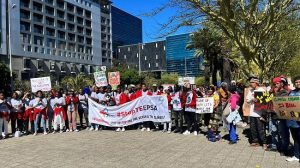From September 13 to 14, 2023, government officials and corporate representatives are gathering at the Southern Africa Oil and Gas Conference in Cape Town, which activists say is aimed at expanding oil and gas exploration in oceans and key biodiversity hotspots.

On Wednesday, September 13, united organisations and movements – including The Climate Justice Charter Movement, Feed the Future for Life, Extinction Rebellion, Southern African Faith Communities Environment Institute (SAFCEI), African Climate Alliance, Save our Sacred Lands, The Green Connection, and Project 90 by2030 – led a unified protest action outside the Cape Town International Convention Centre (CTICC), to resist the gathering. The protest action was a “Call for Climate Justice Resistance Against Oil and Gas Corporations”.
The Green Connection’s Lisa Makaula says: “It is very worrying that the Department of Mineral Resources and Energy (DMRE) and Petroleum Agency SA (PASA) are hosting an oil and gas conference, especially since we have just recently, at the African Climate Summit, raised our concerns about investments in fossil fuels, particularly in the oil and gas sector. We want to see is government investing more in projects that are sustainable – projects that will benefit South Africans, not projects in oil and gas.”
The organisations say that civil society must unite and fight against the destruction of life and our planet for the benefit of a few corporations. We must unite to protect the life-enabling commons. Too many people have already paid the ultimate price.
The Karoo, an area where 40% of the plants are found nowhere else in the world, is one of the areas earmarked for shale gas extraction (fracking).
“This is unsurprising given the fact that the ANC-led government has accelerated the Oil and Gas Amendment Bill and the Petroleum Development Bill, both of which expand the legal infrastructure for oil and gas exploration. Despite climate shocks like the drought (2014–2021), flash floods (in April 2022), heatwaves in January 2022, and flooding in several provinces in February 2022, claiming multiple lives and destroying multiple livelihoods, the government does not appreciate the urgency of the climate crisis.”
Lydia Petersen from the Southern African Faith Communities’ Environment Institute (SAFCEI) says: “We, as SAFCEI believe that there is no place for oil and gas in our energy mix. It is imperative that we take care of our environment and natural resources. This is why I came here to protest this Oil and Gas Summit. We believe that it is critical to take the next steps forward in promoting renewable energy, as best as we can.”
The organisations point out that in terms of global mean annual temperatures, July was the hottest month on record. This could be the hottest recorded summer in Southern Africa because of the projected El Nino. The Southern African region is already warming at about twice the global rate of temperature increase.
“This will lead to more rain bombs, tornadoes, devastating heatwaves and other climate shocks that will destroy multiple lives. We must stand united and resist oil and gas corporations and the governments they control!”
According to the organisations, “We stood together with workers, the poor, unemployed and victims of climate shocks in South Africa and the world to demand:
- Ambitious just transition plans from all carbon corporations and polluters so we accelerate the realisation of zero emissions and prevent a 1.5C overshoot;
- No new investments in oil, gas, nuclear and coal;
- All governments to withdraw subsidies from fossil fuel industries and redirect this money to socially owned renewable energy transitions;
- The UN establish an “End Fossil Fuel Treaty” which ensures fossil fuel corporations pay the world a carbon debt for the harm they have caused, poor countries are compensated for a problem they did not create, including poor countries with fossil fuel reserves, and the oil, coal and gas industries are shut down in the next 10 years or sooner.
- 1.5°C is not negotiable. Our common future is in jeopardy and we are ready to fight for it. People and planet before profits.
- We demand the ANC Government place the country on a climate emergency footing given scientific forecasts of a very hot Summer.
- A Climate ‘Nuremburg trial’ for fossil fuel corporate executives for the crime of eco-cide; the mass scale destruction of human and non-human life.”
